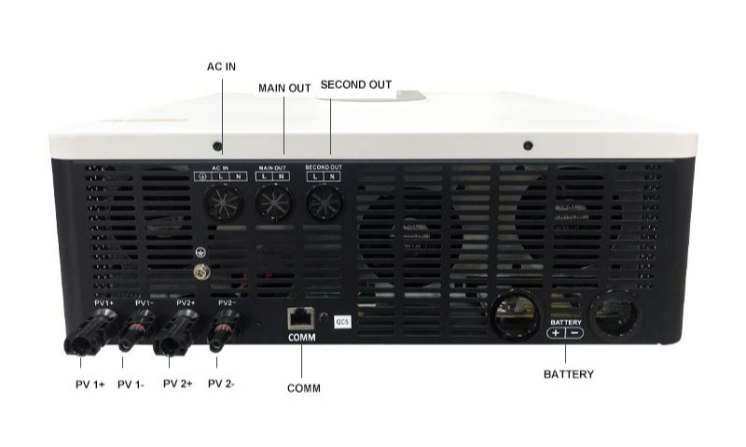What is a high frequency solar inverter?
Jul 30, 2024
With the rapid development of renewable energy technology, solar inverters, as the "heart" of photovoltaic systems, have a direct impact on energy conversion efficiency and system stability through technological iteration. As a company deeply involved in the field of energy storage batteries, GreenMore combines years of industry experience to analyze the technical principles, core advantages and application scenarios of high-frequency solar inverters, helping users build efficient and intelligent photovoltaic storage integrated systems.
1. Working principle of high frequency solar inverter
High-frequency solar inverters use high-frequency DC/AC conversion technology, and its core process can be divided into three steps:
Low-voltage DC boost: Through PWM (pulse width modulation) technology, the low-voltage DC power (such as 12V/24V) output by the solar panel is converted into high-frequency low-voltage AC power (frequency is usually above 20kHz).
High-frequency transformer boost: High-frequency AC power is boosted to high-voltage DC above 300V by a high-frequency transformer, achieving miniaturization (traditional industrial frequency inverters require bulky 50Hz transformers).
Inverter output: Through the precise control of IGBT fully controlled devices, high voltage DC is inverted into 220V/50Hz pure sine wave AC to meet the load requirements of household appliances, industrial equipment, etc.
Compared with traditional industrial frequency inverters, the high-frequency design reduces the equipment volume by more than 50% and the weight by 40% through high-frequency switching devices and micro-transformers, making it particularly suitable for distributed photovoltaic scenarios with limited space.
Core Features:
No power frequency transformer design
Small size and light weight
High conversion efficiency
Fast response speed and good dynamic performance
2. Advantages of high-frequency solar inverters
High conversion efficiency
Due to the use of advanced power electronics technology and optimized topology, the overall conversion efficiency of high-frequency inverters can usually reach more than 95%, which is much higher than that of traditional low-frequency inverters. This means less energy loss and higher power generation utilization.
Small size, easy to install
Since high-frequency inverters do not rely on bulky transformers, they are smaller and lighter overall, making them particularly suitable for home environments or distributed energy projects with limited space.
Lower costs
High-frequency inverters have relatively low manufacturing costs and are easy to mass-produce, so they are more price competitive in the market.
Fast response and strong adaptability
High-frequency inverters have faster load response capabilities and can quickly adapt to changes in light intensity and load fluctuations, improving system stability and reliability.
3. Typical application scenarios of high-frequency solar inverters
Home photovoltaic energy storage system
For ordinary household users, high-frequency inverters are very suitable for small rooftop photovoltaic systems with GreenMore's wall-mounted energy storage batteries or stacked energy storage batteries to achieve closed-loop energy management of self-generation, self-energy storage and self-use of electricity.
Commercial distributed photovoltaic projects
In small and medium-sized commercial photovoltaic projects such as office buildings and factory roofs, high-frequency inverters have become one of the mainstream choices due to their high efficiency, low cost and easy maintenance.
Off-grid/hybrid system applications
In conjunction with GreenMore's home energy storage system or commercial battery energy storage cabinet, high-frequency inverters can be used to build efficient and reliable off-grid or grid-connected hybrid energy systems to meet a variety of power supply needs.
4. High frequency vs low frequency inverter: How to choose?
Feature
High Frequency Inverter
Low Frequency Inverter
Conversion efficiency
High (more than 95%)
Lower (about 85%)
Volumetric Weight
Small and light
Big and heavy
Impact resistance
Low
High
Cost
Low
High
Applicable scenarios
Household, small and medium business
Industrial, high power, harsh environment
As you can see, high-frequency inverters are more suitable for users who focus on efficiency, cost, and space utilization, while low-frequency inverters are suitable for industrial-grade scenarios that need to withstand high impact loads or operate for long periods of time.
5. Purchase Guide: How to match GreenMore energy storage products?
Power matching: Select the inverter power according to the GreenMore energy storage battery capacity. For example, a 5kWh wall-mounted battery is recommended to be paired with a 3kW-5kW high-frequency inverter to ensure maximum charging and discharging efficiency.
Output waveform: Give priority to pure sine wave output models to avoid harmonic interference of square wave/modified wave inverters on motor loads (such as water pumps and refrigerators).
Communication protocol: Select an inverter that supports RS485/CAN bus communication, which can be linked with the GreenMore Energy Management System (EMS) to achieve remote monitoring, fault warning and strategy optimization.
When purchasing a high-frequency inverter, it is recommended to focus on the following points:
Rated output power: ensure that it matches your PV system capacity and load requirements;
Maximum input voltage and MPPT range: to adapt to PV modules of different specifications;
Conversion efficiency: The higher the better, which directly affects the power generation revenue;
Protection level and heat dissipation performance: ensure long-term stable operation of the equipment;
Compatibility: whether it supports seamless integration with GreenMore energy storage batteries;
Brand and after-sales service: Choose a strong and reputable brand, such as Growatt, GreenMore, GoodWe, HUAWEI, etc., to ensure worry-free after-sales service.
With the development of photovoltaic power generation technology, high-frequency solar inverters have become the preferred configuration for home and small and medium-sized commercial photovoltaic systems due to their advantages of high efficiency, small size and low cost. Combined with GreenMore's high-quality energy storage products, you can easily build an efficient, intelligent and sustainable home or business energy management system.
If you need to learn about product adaptation solutions or technical consultation, please visit GreenMore's official website www.gmsolarkit.com or contact our technical team (email: export@gmsolarkit.com). We will provide you with professional product support and customized services to help you move towards a green energy future.



 Network Supported
Network Supported